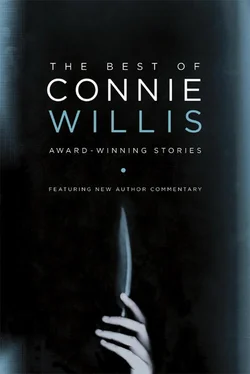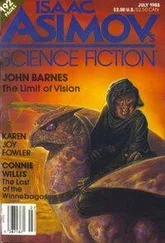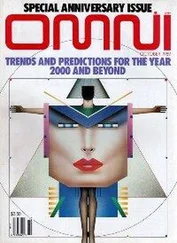He had Stitch with him. And all the magazines. “I’m sorry, Mrs. Talbot,” he said. “If you’d like, I’ll put them under the house and you can send Lynn for them one at a time.”
“It doesn’t matter,” she said. “I don’t feel like reading them anymore.”
Dad put the magazines on the couch and sat down at the card table. Mom dished him up a bowl of soup. “I got the seeds,” he said. “The tomato seeds had gotten soaked, but the corn and squash were okay.”
He looked at me. “I had to board up the post office, Lynn,” he said. “You understand that, don’t you, that I can’t let you go there anymore? It’s just too dangerous.”
“I told you,” I said. “I found it. While I was looking for a magazine.”
“The fire’s going out,” he said.
After they shot Rusty I wasn’t allowed to go anywhere for a month for fear they’d shoot me when I came home, not even when I promised to take the long way around. But then Stitch showed up and nothing happened and they let me start going again. I went every day till the end of summer and after that whenever they’d let me. I must have looked through every pile of mail a hundred times before I found the letter from the Clearys. Mrs. Talbot was right about the post office. The letter was in somebody else’s box.
Afterword for “A Letter from the Clearys”

I wrote “A Letter from the Clearys” when we were living in a town in the Rocky Mountains called Woodland Park, up the pass from Colorado Springs. Woodland Park was at that time a little town with dirt roads, lots of pine trees, aspens, and wildflowers, and a gorgeous view of Pikes Peak.
What it didn’t have was home mail delivery. I had to walk up to the post office to get the mail. With my dog. So I suppose you can figure out where I got the idea for the story.
But I also remember the post office for what was the worst day of my writing life up till then, and one of the worst two or three of my whole career. In those days you had to mail your manuscript in to the magazine instead of e-mailing it, and you had to enclose a self-addressed stamped envelope (SASE) so the editor could send it back to you with a rejection slip attached.
Since this meant numerous trips to the post office, I used to buy extra stamps and make out two manila envelopes and two SASEs at the same time, one for the magazine I was sending it to and a second set for the magazine I’d send it to after the first one rejected it.
I got lots of rejection slips in those days (usually literally a slip of paper only an inch wide with “We are sorry, but your manuscript does not meet the needs of our publication” typed on it), but I was always able to keep my spirits up by telling myself that even though this one had been rejected, there was still a chance I might sell the one I had out to Galileo . Or to Asimov’s .
But on this particular day when I went to get the mail, I found not a rejected manuscript, but a yellow slip telling me to go to the counter. Oh, goody , I thought. My grandmother’s sent me a present , and traipsed up to the counter to collect it.
It wasn’t a present, or even a package. It was a stack of manila envelopes with my handwriting on them, all eight of the stories I had had out at the time, all rejected. Not a single one left at Omni or F and SF for me to convince myself I might sell.
Hmm , I thought on the long walk home. Maybe they’re trying to tell me something . And the something was obviously that I should quit, give up, stop making an idiot of myself, and go back to teaching school.
What saved me from doing just that was those already made-out and stamped envelopes and SASEs. I mean, stamps were expensive, and what would it hurt to send everything out one last time?
Luckily, one of the stories in that batch—“The Child Who Cries for the Moon”—sold to an anthology, A Spadeful of Spacetime , which encouraged me enough that I kept writing till I eventually sold to Galileo , and to Asimov’s and Omni and F and SF . And till I wrote “A Letter from the Clearys” and “Fire Watch,” which won the Nebula. And changed the whole course of my life.
But it was close. And even though it sounds like a funny little anecdote now, there was nothing funny about it at all when it happened.
So, to any struggling young writers who may be reading this, my message to you is, “Keep slogging on no matter how many rejection slips you get or how discouraged you are.” Or, as my hero Winston Churchill would put it, “Never, never, never give up.”
AT THE RIALTO

Seriousness of mind was a prerequisite for understanding Newtonian physics. I am not convinced it is not a handicap in understanding quantum theory.
—EXCERPT FROM DR. GEDANKEN’S KEYNOTE ADDRESS TO THE 1989 INTERNATIONAL CONGRESS OF QUANTUM PHYSICISTS ANNUAL MEETING, HOLLYWOOD, CALIFORNIA
I got to Hollywood around one-thirty and started trying to check into the Rialto. “Sorry, we don’t have any rooms,” the girl behind the desk said. “We’re all booked up with some science thing.”
“I’m with the science thing,” I said. “Dr. Ruth Baringer. I reserved a double.”
“There are a bunch of Republicans here, too, and a tour group from Finland. They told me when I started work here that they got all these movie people, but the only one so far was that guy who played the friend of that other guy in that one movie. You’re not a movie person, are you?”
“No,” I said. “I’m with the science thing. Dr. Ruth Baringer.”
“My name’s Tiffany,” she said. “I’m not actually a hotel clerk at all. I’m just working here to pay for my transcendental posture lessons. I’m really a model/actress.”
“I’m a quantum physicist,” I said, trying to get things back on track. “The name is Ruth Baringer.”
She messed with the computer for a minute. “I don’t show a reservation for you.”
“Maybe it’s in Dr. Mendoza’s name. I’m sharing a room with her.”
She messed with the computer some more. “I don’t show a reservation for her, either. Are you sure you don’t want the Disneyland Hotel? A lot of people get the two confused.”
“I want the Rialto,” I said, rummaging through my bag for my notebook. “I have a confirmation number. W37420.”
She typed it in. “Are you Dr. Gedanken?” she asked.
“Excuse me,” an elderly man said.
“I’ll be right with you,” Tiffany told him. “How long do you plan to stay with us, Dr. Gedanken?” she asked me.
“ Excuse me,” the man said, sounding desperate. He had bushy white hair and a dazed expression, as if he had just been through a horrific experience. Or had been trying to check in to the Rialto.
He wasn’t wearing any socks. I wondered if he was Dr. Gedanken. Dr. Gedanken was the main reason I’d decided to come to the meeting. I had missed his lecture on wave/particle duality last year, but I had read the text of it in the ICQP Journal , and it had actually seemed to make sense, which is more than you can say for most of quantum theory. He was giving the keynote address this year, and I was determined to hear it.
It wasn’t Dr. Gedanken. “My name is Dr. Whedbee,” the elderly man said. “You gave me the wrong room.”
Читать дальше













